At the moment, only
551 people have been in space - a vanishingly small number of the total population of the Earth at 7.6 billion (only 0.00000725%). But given the kind of strong motivation they had to make their way into the cosmonauts / astronauts / taikonaut, and the kind of fame they received as a result of their flights - there were quite a few
politicians among them, but the leaders of the countries did not exist until October 2 of this year ( In this case, we are talking about the post of
Governor-General of Canada ).
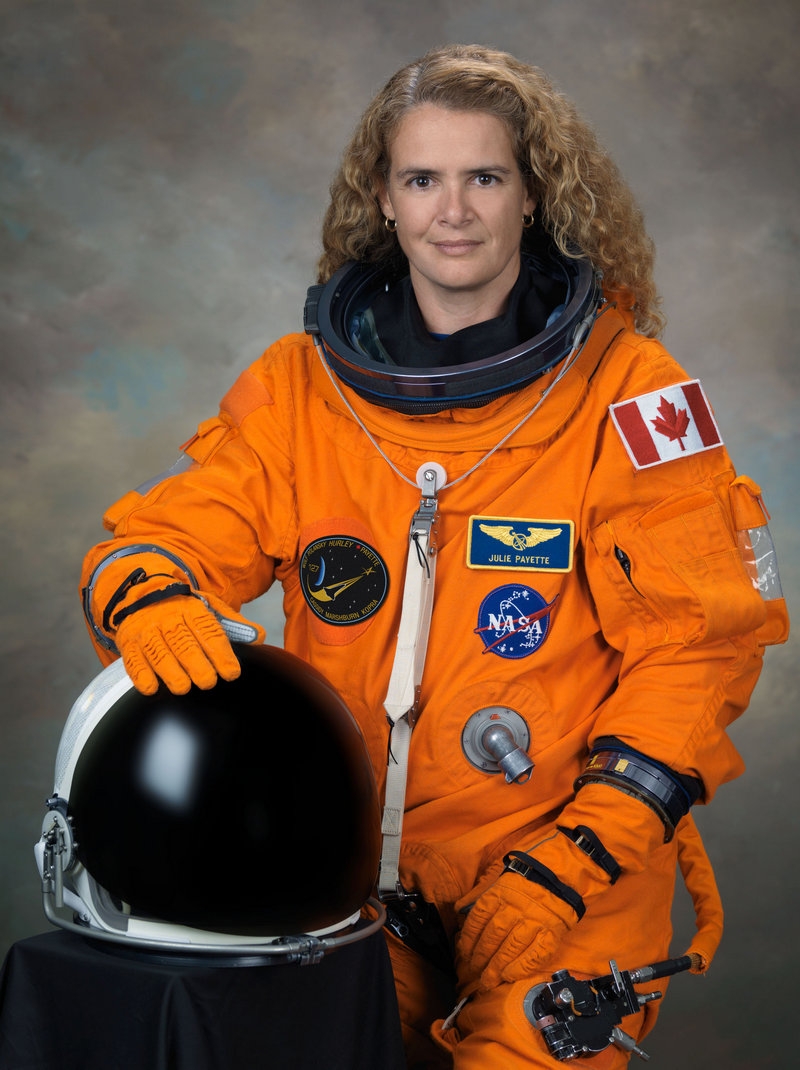
They became
Julie Louise Payette - an engineer, an entrepreneur and an astronaut who made 2 flights into space, who knows 6 languages (including English and French, as well as Spanish, Italian, German and Russian), plays the piano and flute, and runs , tennis, diving and among other things acted as a singer with the
Montreal Symphony Orchestra .
Julie Payet was born on October 20, 1963 in
Montreal in the family of a theater accountant and engineer. After graduation, she enrolled at Atlantic International College in South Wales, which she graduated in 1982. By 1986, she received a bachelor's degree in electrical engineering
from McGill University , after which she continued her studies at the
University of Toronto, who graduated in 1990 with a master's degree in applied sciences. The first 2 years of this period she worked in the engineering department in the Canadian division of IBM, and the second 2 years in the university itself in the direction of computer speech recognition, which was the subject of her diploma.
She got the attention of IBM ’s chief executive, Claude Guaya , while she was a student at McGill University and was hired immediately after graduation. “It was immediately clear that we got a very gifted employee,” recalls Guai. “People raved about what kind of work she would do. We were very disappointed when she left. ”
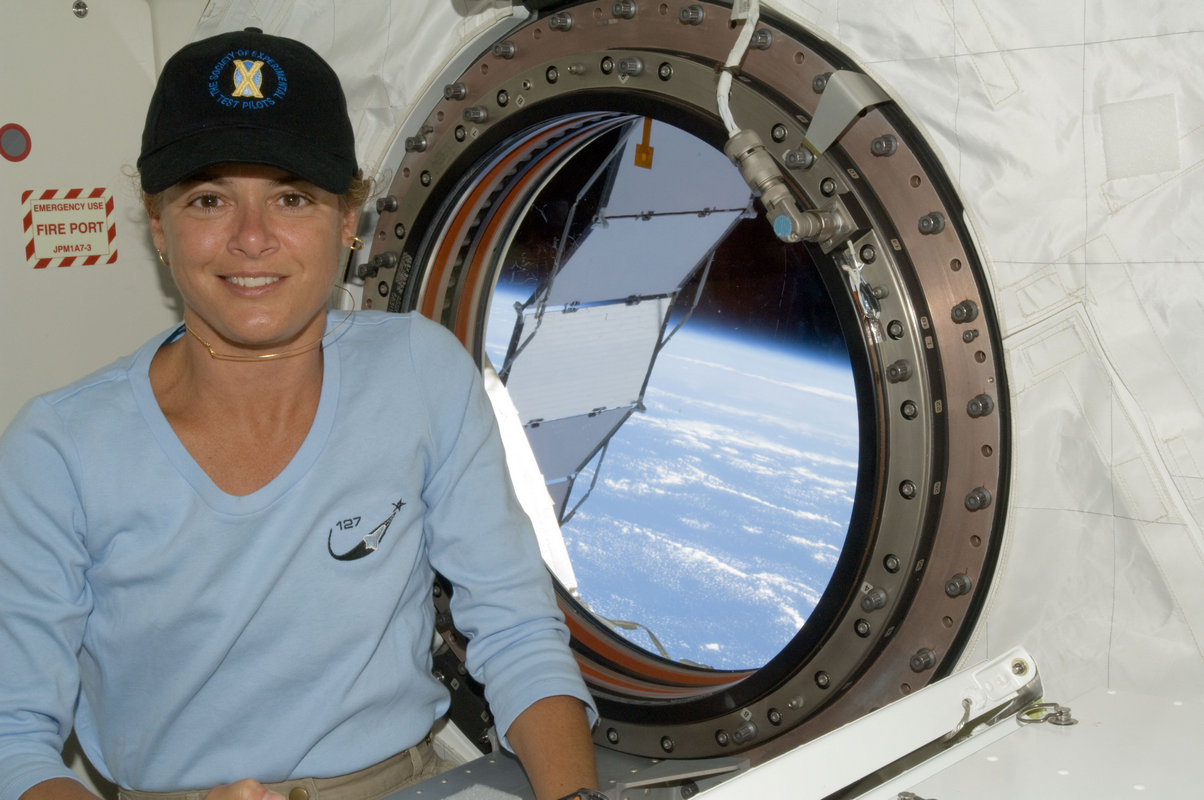 During the second space flight
During the second space flightAfter graduating from university, she entered the IBM Communications and Science Department in
Zurich . In January 1992, she returned to Canada to work in the Bell-Northern Research speech research group in Montreal. At the same time, she submitted an application to the Canadian Space Agency (
CSA ) among 5,330 applicants and on June 8 she was enrolled in the CSA astronaut team among the 4 selected applicants, including
Christopher Hadfield . In 1993, she organized a human-computer interaction group in an astronaut detachment, and also served as a technical specialist in an international speech research research group at NATO until 1996.
In the late 1980s, Julie Payette asked Graham Hirst about whether she could enroll in a magistracy at the University of Toronto, but the answer was no because Payette had an education in computer science, but not in computer science. “However, she does not accept negative answers,” says Professor Hurst. She entered the course by filling in gaps in her free time education. “Brilliant, hardworking, a little persistent”: so said Professor Hurst describing his student, who succeeded in everything that she would not begin. In his opinion, it was the natural choice for the 1992 space set. He also believes that it is a suitable choice for the post of governor-general of Canada. “Miss Payette is classified as kind and polite people. She was both a student and an astronaut, ”he adds.
In preparation for her space flight in February 1996, she received a pilot's license and spent 120 hours in the role of operator-researcher on a plane simulating weightlessness. Already in April of the same year, she conducted training and received a license for deep-sea diving in a hard space suit, and in August she entered training at
the Lyndon Johnson Space Center and 2 years later was assigned to the crew of the
STS-96 Shuttle Discovery.
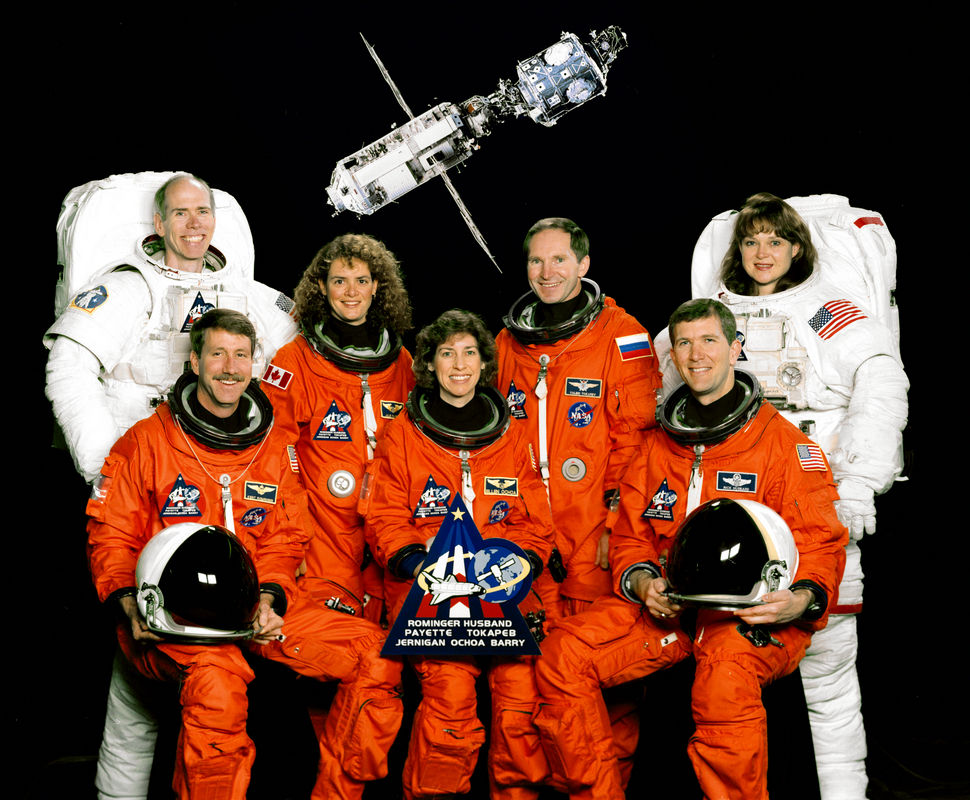
During this flight, which took place from May 27 to June 6, 1999, the
ISS was not yet completed and consisted of only two modules, and Julie Payet became the
7th astronaut of Canada and the 1st to visit the ISS, as well as the 2nd Canadian woman space. During this flight, she assisted astronauts during their spacewalk and carried out repair of the batteries of the Zarya module together with the Russian cosmonaut
Valery Tokarev .
“Looking back, it was the wisest choice,” says astronaut Marc Garno , who was on the board of the 1992 astronauts who chose the astronauts and is also acting minister of transport.
In 2000, she became a senior astronaut at the space agency, working as a CAPCOM (communications operator with the crew) until her second assignment to the crew of the
STS-127 Shuttle "Endeavor" on February 11, 2008.

The second flight of Julie Payet took place on July 15-31, 2009 and was mainly the continuation of the construction of the ISS. In this flight, she controlled the station's manipulator, together with Timothy Kopra and Koichi Wakata, to whom they transferred equipment for the Japanese
Kibo experimental module from the Shuttle cargo compartment.
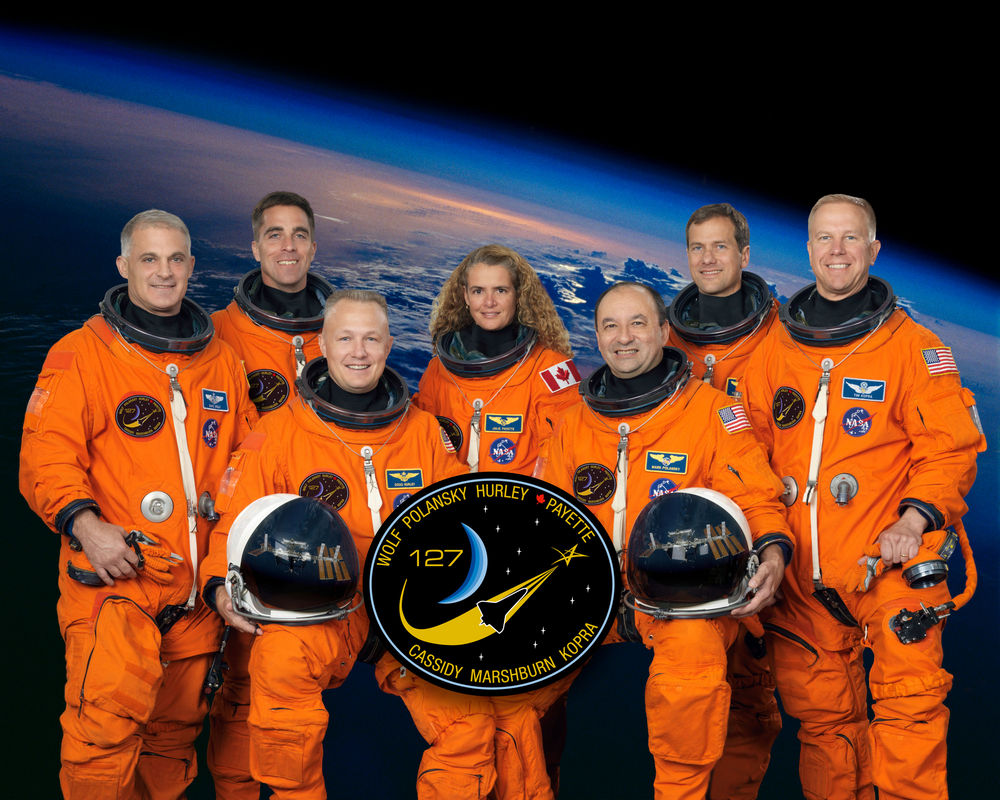
After retiring from CSA, she worked at the
Woodrow Wilson International Center for Scientists in Washington, DC, being at the same time a representative of the Quebec government in the United States. At the same time, she was a member of the board of
Own The Podium and the Board of Directors of the Olympic Committee of Canada during the
2010 Winter Olympics.
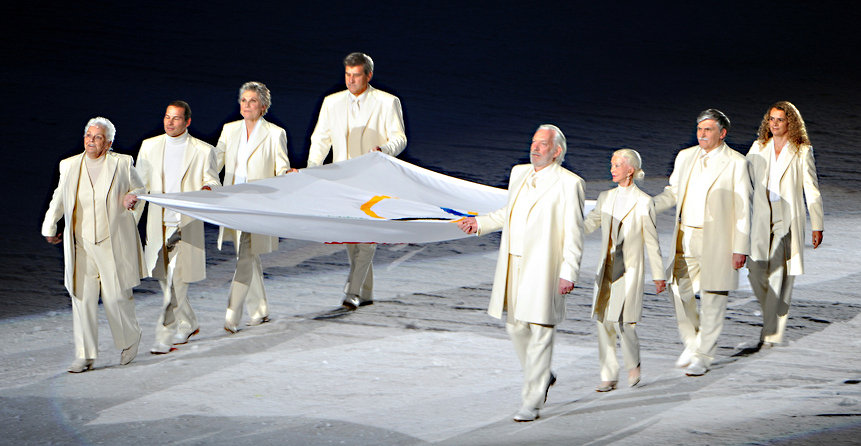
From left to right: Betty Fox,
Jacques Villeneuve ,
Ann Murray ,
Bobby Orr ,
Donald Sutherland ,
Barbara Ann Scott ,
Romeo Duller Julie Payet carrying the Olympic flag during the opening of the Olympic Games.
She spent the next 3 years as executive director of the Montreal Science Center Museum and Vice President of Canada Lands Company, since April 2014 she became director of the
National Bank of Canada , and also served at various times at the board of directors of
Queens University , the foundation of the Montreal Science Center, The Montreal Bach Festival, the organization
Children of Canada without drugs and others. She is also a member of the International Academy of Cosmonautics and a member of the engineering advisory board of McGill University.
 October 2, 2017 at the inauguration ceremony
October 2, 2017 at the inauguration ceremonyOn July 13, 2017, she received recommendations from Canadian Prime Minister
Justin Trudeau for the post of the 29th
Governor-General of Canada, after which her candidature was approved by the Queen of England for this post. She took office on October 2 of this year, thus becoming the 4th leader of Canada in her 150-year history. After the inauguration, she encouraged all Canadians to work together on issues such as climate change, migration, and poverty:
“Anyone can achieve everything by rising above the problem if he works together with others, lowering his personal problems for the sake of achieving the highest goal and doing what is right for the common good. This is exactly what I hope will reflect my service as governor-general, ”she said.
List of awards2000 - Knight of the National Order of Quebec
2001 - Commander
of the Pleiades Francophone
Order2010 - Member of the Canadian Aviation Hall of Fame
2010 - Canadian Gold Medal of Engineers
2010 - Officer of the Order of Canada
2012 - Queen Elizabeth II Diamond Jubilee
Medal2016 - Commander of the Order of Montreal
Honorary Degrees1999 - PhD at the University of Queens
1999 -
Honorary Doctor of the University of Ottawa
2000 - Simon Fraser, LL.D.
2000 - Laval University Doctorate
2001 - Regina University Doctorate
2001 - doctoral degree from the
Royal Road University2001 - PhD at the University of Toronto
2002 - Doctor of Science at the Victorian University
2002 - Doctor of Science at Nipissing University
2003 - Doctor of Science at McGill University
2004 - Honorary Doctor of the University of Mount St. Vincent
2004 - Doctor of Science at McMaster University
2005 - Doctor of Science of the University of Letbridzh
2006 - doctoral degree from the University of Alberta
2010 - Doctor of Science at the University of British Columbia
2010 - Doctor of Science at York University
2010 - Doctor of Science at Concordia University
2010 - Waterloo University Ph.D.
2011 - Doctor of Law, Niagara University
2012 - Doctor of Technical Sciences at Carleton University
2012 - Doctor of Technical Sciences at the University of Vancouver
2013 - Doctor of Science at the University of Manitoba
2013 - Doctor of Law, University of Calgary
2016 - Doctor of Technical Sciences of the British Columbia Institute of Technology